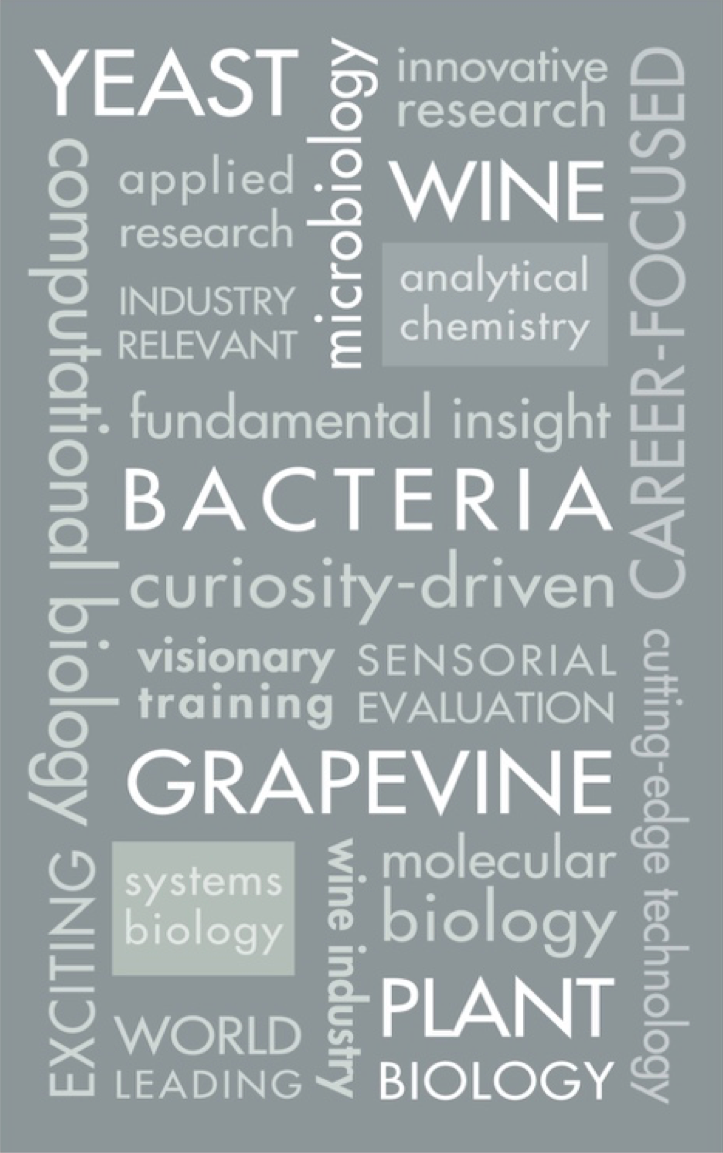The core research disciplines of the Institute include Viticulture, Oenology, Biotechnology, Sensory and Consumer Science, Chemistry and Spectroscopy as well as Data Science. These disciplines converge and form the base of the “Integrated Grape and Wine Sciences core that underlie our various research themes/programmes.

The main research programmes/themes include:
The Grapevine Biology/Biotechnology and Improvement programme
The Grapevine Biology/Biotechnology and Improvement programme includes aspects of Grapevine Genetics, Genomics and Metabolomics. Projects in this programme may be co-supervised by several researchers as the projects are typically cross-cutting in their scope. In general, all research makes use of a combination of molecular tools, plant tissue culture, analytical techniques and computational approaches to answer questions surrounding grapevine cellular physiology in response to environmental and developmental cues.
The Grapevine x Environment x Management Interactions (GEMs) programme
The Grapevine x Environment x Management Interactions (GEMs) programme involves the study of grapevines in interaction with their biotic and abiotic environments. In this GEMS programme research is being conducted that integrates aspects of vineyard characterization in terms of the site and climate, as well as the performance of the grapevines in terms of growth and fruit production and ripening. Very often, model vineyards are used to evaluate the impacts of particular abiotic, or biotic stresses to inform, or improve management practices. These projects typically span from the vineyard to the final products (wine or table grapes) and is therefore integrating different types of data. The use of remote sensing tools and/or the development of novel sensors to monitor the grapevine responses is also a key driver. Several academics contribute to this programme and a range of viticultural, physiological, molecular, analytical and advanced data analyses tools are routinely used. Students from diverse backgrounds (even if you do not have a background in Viticulture and Oenology) would be able to contribute to the research of this programme.
The Digital Viticulture “New Tools for Precision Management” programme
The Digital Viticulture “New Tools for Precision Management” programme focuses on Improving the efficiency and quality of wine and table grape production through sensors, robots and advanced analytics. Our projects are related to climate change impacts on agriculture, estimations of water consumption using models and micrometeorological techniques, development of new computational and technological tools for precision viticulture and plant physiology and detection of water stress using Thermography, Remote sensing and Unmanned Aerial Vehicles.
The Wine Microbial Ecosystems And Biotechnology programme
The Wine Microbial Ecosystems And Biotechnology programme is a multidisciplinary, integrated program uses diverse complementary tools to assess the diversity of microorganisms in vineyards and wine fermentation processes and further explores the impact of mono- and mixed-cultures on wine properties. The molecular mechanisms underpinning interspecies interactions in diverse settings are investigated using a combination of microbiology, molecular biology and systems biology approaches. The current research topics include: Influence of vitiultural practices on vineyard and fermentation microbiome; Yeast-yeast and yeast-bacteria interaction during fermentation; Yeast-microalgae for wine wastewater bioremediation; Using omics technologies to study microbial physiology and metabolism; Microbial strain improvement using biotechnology, breeding and directed evolution approaches; and Biochemical and oenological characterization of strains.
The Wine Production programme
The Wine Production programme focusses on processes that can influence the quality and composition of wine in a cellar environment. These can include, among others, grape processing, juice treatments, fermentation and oxidation control and ageing regimes of wine. The aim of this program is to generate results that could be applied in a cellar set up to positively influence wine production and composition.
The Spectroscopic Applications in Grape and Wine Sciences programme
The Spectroscopic Applications in Grape and Wine Sciences programme works towards non-destructive analytical methods for process monitoring and quality control in Viticulture, Oenology and Wine Biotechnology. The analytical technologies used are near- and mid-infrared spectroscopy coupled with multivariate data analysis tools. Applications, mostly in the form of classification and regression models, using multivariate classification and calibration algorithms, are developed and transferred to industry. Infrared spectra are coupled to flavour chemistry (using mass spectrometry and chromatography) and sensory data on same samples for multi-block analysis. An important application area of infrared spectroscopy is multi-scale quality monitoring of table grapes – in the vineyard, at the packhouse and during cold storage. In another application the combination of spectroscopy, chemometrics and process control strategies can be used to implement process engineering solutions during wine fermentations.
The Sensory and Consumer Science of Wine programme
The Sensory and Consumer Science of Wine programme involves the development and application of fit-for-purpose methods to obtain sensory profiles of wines; research into consumers’ perceptions, acceptance of products; and rejection thresholds for off-flavour compounds in wine; chemical profiling of wines related to sensory studies and interaction studies within wine matrices.

